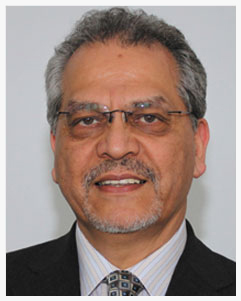РђўDual Citizenship To NRNs Is An Investment Into The FutureРђЎ
Founder and Patron NRN-Association, RAM PRATAP THAPA, was born in Gorkha and raised in Bhairahawa and Kathmandu. He pursued his higher studies in Kathmandu and Nuremberg, Germany. An MBA with majors in Financing and Marketing, he arrived in Germany in 1976 and is now working as an Analyst at one of the biggest Savings Bank Group of Germany. Honorary Consul of Nepal for three states in Germany, he is also the president of the German Nepal Friendship Association. He maintains interest in Nepali literature and lives in Cologne with his wife and two sons. Since as per the constitution of the NRNA, President canРђЎt compete for the fourth term, Thapa said he has announced his candidacy for the post of president of the NRN Association in the forthcoming Global Conference of NRNs in October this year. He spoke to GLOBAL NEPALI mainly on the dual-citizenship issue. Excerpts:
Why is the NRNA demanding dual-citizenship for the Non-resident Nepalese?
Dual citizenship serves as a guarantor for long term link between the former motherland and the person concerned. Cases from India, Pakistan, china, Israel and many other countries have proved that Non-residents can play a vital role to the development of their former motherland. A provision of dual citizenship will not only give a feeling of being part of Nepal, it will also give them a sense of security thereby encouraging them to work more for their country of birth. It is a means to link PNOs (Persons of Nepali Origin) with Nepal.
How does Nepal stand to benefit by awarding dual-citizenships to NRNs?
Awarding dual citizenship to NRNs is an investment into the future. By awarding dual citizenship, Nepal can hope not only for immediate investment from PNOs, it will also open door for long term future inflow of support from the second and third generation of PNOs. For first generation of Nepalis, dual citizenship might not be that attractive and Nepal may not feel so much benefitted. But for second and third generations, this is the only means to connect with them. Look, there are hundreds of countries waiting to welcome younger generation. Why should these PNOs go to Nepal, if they are treated like anybody else? By giving special status, it may attract many second and third generation of PNOs to Nepal and motivate them to visit the country where their parents were born and transfer their knowledge and skills.
How can NRNs contribute to socio-economic development of Nepal?
A lot. By keeping doors open to PNOs, Nepal will be inviting not only capital to the country, but also technological know-how and knowledge. It may help to change Nepal by bringing fresh innovative ideas. We are living in a global world today and the distance is being shorter and shorter. Despite being wealthy in terms of culture and natural resources, Nepal is dependant heavily on foreign aid. Hundreds of Nepali youths leave abroad every day in search of job. We need to work on a new, inclusive development paradigm where jobs are created within the country and there is guaranty of rule of law. NRNs can contribute a lot in the socio-economic transformation of the country directly as well as through their contacts which they have nurtured over the last several decades.
What makes you busy recently?
Apart from regular tasks I am also working as a coordinator of Task Forces for 1) Dual citizenship, 2) Flood relief project, 3) NRN sustainability. I have travelled to many countries to meet Nepalis and attended all regional conferences organised by regional chapters of the NRNA. My motto is to work for a better Nepal in and outside Nepal and I will be happy to shoulder any responsibility that NRN friends and delegates bestow upon me.
1 Comment to “РђўDual Citizenship To NRNs Is An Investment Into The FutureРђЎ”
Add Comments (+)-
Your commitments seem to be viable. But, the coordinated effort for investment in the prioritized sectors in Nepal is MOST,.. WIshing you all the best for you election as president of NRN…..



